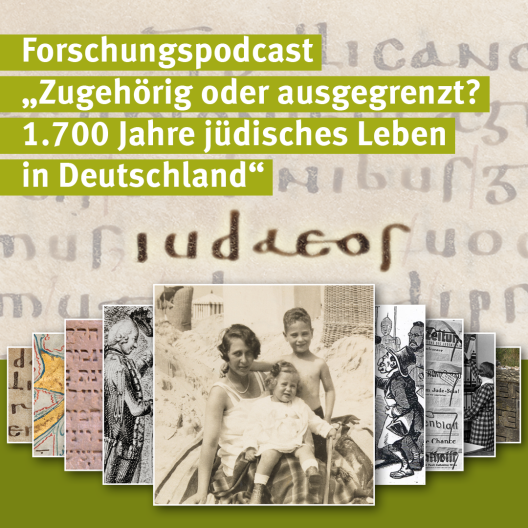“Remembering is an integral part of Jewish life”
Cluster of Excellence’s new research podcast “Belonging or Excluded?” sheds light on 1,700 years of Jewish life – Researchers from Jewish Studies, History and Theology use pictures, manuscripts and photos to report on the everyday and religious life of Jews, as well as on their exclusion and persecution – Podcast as part of the year of celebration “2021: Jewish Life in Germany"
Press release from 19 April 2021

According to Jewish scholars, remembering one’s own history, as is the case in the nationwide year of celebration “1,700 years of Jewish life in Germany”, has always been an integral part of Jewish life. “Jewish culture has always had a close relationship with its own history, and not only since the Shoah, and is strongly defined by its collective memory”, say Jewish scholars Regina Grundmann and Katrin Kogman-Appel from the University of Münster’s Cluster of Excellence “Religion and Politics”. They were speaking at the start of the Cluster podcast series “Belonging or Excluded? 1,700 years of Jewish life in Germany”. Together with other colleagues from Jewish Studies, as well as with historians and theologians, they will use selected case studies from the first mention of Jews in late antiquity to the present day to recount Jewish life in Germany. In doing so, they will draw on their research and on a variety of visual sources: from Emperor Constantine’s edict of 321 to richly decorated books of Jewish liturgy in the Middle Ages; from holiday photos showing Jewish bathing culture on Norderney in the early 20th century and the Central Association of German Citizens of the Jewish Faith (Centralverein deutscher Staatsbürger jüdischen Glaubens) in the first few years of the Nazi dictatorship to the commemoration of the Shoah today.
“The podcast reports on Jewish life in Germany in all its fullness, without ignoring anti-Judaism, anti-Semitism and persecution over the centuries, or constructing false continuities over time”, say Grundmann and Kogman-Appel. A more nuanced picture only emerges in recent research, says Humboldt Professor Kogman-Appel, “when, beyond a lacrimose historiography that describes Jewish life primarily as exclusion, affiliations with the majority society are also revealed. This is the focus of the Cluster of Excellence’s annual theme ‘Belonging and Demarcation’ – and also of our podcast series, which is part of the year of celebration ‘1,700 years of Jewish life in Germany’”. The podcast throws light both on flourishing Jewish life in different periods and on recurring tensions with the majority society, which includes exclusion and persecution.
Weekly podcast episodes from antiquity to the present day
As Kogman-Appel explains, the lives of Jews in the Middle Ages, for example, did not take place in isolation, as some still believe today: “In everything that distinguished Jews from their environment, they also lived quite closely together with Christians. This also applied to politics and trade. There was also a lot of closeness in clothing and language, Yiddish”. Demarcations also originated from Jews: “One aim of Jewish community rituals was to demarcate themselves from the Christian environment, to define their own identity, and to ensure the group’s cohesion over the centuries”. (sca/vvm)

